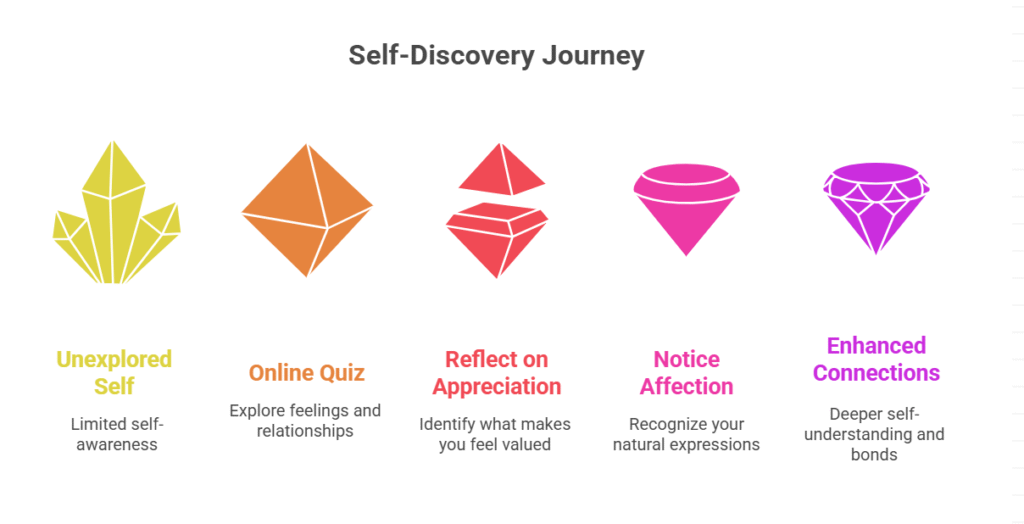Type in love they’re usually referring to the unique way they express affection, attraction, and commitment. It’s more than just a preference for certain looks or personalities it’s about the emotional patterns and love languages that define your romantic life.
Why Does Your Type in Love Matter?
Understanding your type in love can help you:
- Communicate better with your partner
- Avoid common relationship pitfalls
- Build stronger, more authentic connections
It’s not about fitting into a box—it’s about discovering what makes your heart tick.
What Is My Love Language? The Foundation of Love Types
One of the most popular ways to explore your type in love is through the concept of love languages. Developed by Dr. Gary Chapman, the five love languages describe the different ways people give and receive love.
The Five Love Languages Types
- Words of Affirmation – You feel loved when you hear kind words, compliments, or encouragement.
- Acts of Service – Actions speak louder than words; you appreciate when someone does things for you.
- Receiving Gifts – Thoughtful presents make you feel valued and remembered.
- Quality Time – You crave undivided attention and meaningful moments together.
- Physical Touch – Hugs, kisses, and cuddles are your go-to ways of showing affection.
Real-Life Example: A User’s Story
“I always thought I was needy until I realized my love language is quality time. Now, I just ask for what I need instead of feeling guilty about it.”
Love Languages Types: How They Shape Relationships
Knowing your love language—and your partner’s—can transform your relationship. Imagine trying to show love through gifts when your partner values acts of service. It’s like speaking two different languages!
How to Discover Your Love Language
- Take an online quiz (there are plenty in 2025!)
- Reflect on what makes you feel most appreciated
- Notice how you naturally express affection
Once you know your love language, you can communicate your needs more clearly and understand your partner’s actions better.

The Name of Childish Love: Exploring Different Types of Love
Not all love is created equal. In fact, the ancient Greeks had several words for love, each describing a different type of connection. One of the most interesting is the name of childish love—also known as “ludus.”
Ludus: The Playful, Childish Love
Ludus is all about flirtation, teasing, and the butterflies you feel in the early stages of romance. It’s the kind of love that makes you giggle, text late at night, and feel like a teenager again.
But childish love isn’t just for the young. Even in long-term relationships, keeping a sense of playfulness can keep the spark alive.
Eros Love: The Passionate Side of Romance
Another classic type in love is eros love—the passionate, physical attraction that draws people together. Eros is intense, exciting, and sometimes overwhelming. It’s the kind of love that inspires poetry, art, and those unforgettable first kisses.
Eros vs. Other Love Types
While eros love is powerful, it’s not always sustainable on its own. Healthy relationships often blend eros with other types of love, like friendship (philia) and commitment (pragma).
How Your Type in Love Evolves Over Time
Your type in love isn’t set in stone. As you grow, experience new relationships, and learn more about yourself, your preferences and love languages can change.
The Impact of Life Stages
- Teenage Years: More ludus and eros, lots of experimentation
- Young Adulthood: Searching for deeper connection, discovering love languages
- Adulthood: Blending passion with stability, valuing acts of service or quality time
- Later Life: Prioritizing companionship, shared memories, and emotional support
The Science Behind Love Types
Modern psychology and neuroscience have shed light on why we love the way we do. Attachment styles, childhood experiences, and even genetics play a role in shaping your type in love.
Attachment Styles and Love Languages
Are you anxious, avoidant, or secure in relationships? Your attachment style can influence which love languages resonate with you and how you respond to intimacy.
Risks and Rewards: Understanding Your Type in Love
Pros
- Better Communication: Knowing your love language helps you express your needs.
- Deeper Connection: Understanding your partner’s type in love builds empathy.
- Personal Growth: Self-awareness leads to healthier relationships.
Cons
- Miscommunication: If you and your partner have different love languages, it can cause confusion.
- Over-Simplification: Love is complex—don’t reduce it to just one type or language.
- Changing Needs: Your type in love can evolve, so stay open to growth.
Features and Usability: Love in the Digital Age (2025)
In 2025, technology makes it easier than ever to explore your type in love. From AI-powered relationship apps to virtual love language quizzes, you can discover your preferences and connect with others who share your style.
- Personalized Quizzes: Get instant insights into your love language.
- Relationship Coaching: Apps offer tailored advice based on your type in love.
- Community Forums: Share stories, ask questions, and learn from others.
Real-Life Example: A Tweet That Says It All
“Just found out my love language is acts of service. No wonder I melt when someone does the dishes for me!”
FAQs
Q What is my love language, and how do I find it?
A. Your love language is the way you prefer to give and receive love. You can discover it by taking a quiz, reflecting on your past relationships, or noticing what makes you feel most appreciated.
Q. What are the different love languages types?
A. The five main love languages types are words of affirmation, acts of service, receiving gifts, quality time, and physical touch. Each person has a unique combination.
Q. What is the name of childish love?
A. The name of childish love is “ludus.” It’s playful, flirtatious, and often found in the early stages of romance.
Q. What is eros love, and how is it different?
A. Eros love is passionate, physical attraction. It’s different from other types of love because it’s focused on desire and excitement, while other types may emphasize friendship or commitment.
Final Thoughts
Understanding your type in love is one of the most powerful steps you can take toward happier, healthier relationships. Whether you’re exploring your love language, rediscovering childish love, or seeking the passion of eros, remember: there’s no right or wrong way to love.
CLICK HERE FOR MORE BLOG POSTS
“In a world of instant takes and AI-generated noise, John Authers writes like a human. His words carry weight—not just from knowledge, but from care. Readers don’t come to him for headlines; they come for meaning. He doesn’t just explain what happened—he helps you understand why it matters. That’s what sets him apart.”


I learned a lot — thank you for sharing!